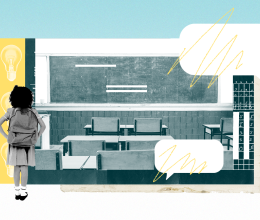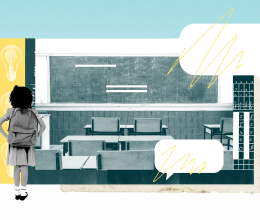
Sonia is a Latina working in higher education in Idaho. She has been serving students at Idaho State University, where she is currently the Director for Undergraduate Research and Outreach, for almost 10 years.
Although Sonia described feeling very supported in her role, she shared that she is sometimes marginalized because of her knowledge of diversity. Several Latino students have also approached her with instances of discrimination, and she shared that many times, first-generation students in particular, do not file complaints. Sonia also shared several ways higher education institutions could continue to support and recognize the skills of Latino students.
Have you ever experienced feeling unwelcome in your work because of your identity?
Absolutely. I have allies within the university that are faculty and administration as far of the work that I do. They are allies because they understand the importance of serving Native, Latino, and generally diverse students. But there are people who may want to do work with these communities but don’t understand the epistemology of these communities. That is where I have been marginalized because my knowledge of diversity or DEI is not recognized. So, I have felt that because of my ethnicity, my contribution was not recognized by some.
Have you ever seen Latino students receive different treatment in higher education?
I have not seen these instances, but I have had Native and Latino students on several occasions come to my office and tell me they have felt marginalized or disrespected in front of other students or in the classroom. And they feel comfortable coming to be because I am Latina.
How have you been able to support Latino students who share these experiences with you?
I have addressed these instances directly with faculty and department chairs and this has resulted in diversity training in the past.
But many times, students feel hurt, and I don’t think they feel empowered to file a complaint. But I let them know they have every right to feel the way they do. And although I was not there and do not know what really happened, I believe that what they internalize is real, and that they have a right to file a complaint with our office of equity and inclusion.
Sometimes Latino students also don’t know the language, so I help them name it. For example, they don’t know if they have experienced microaggressions or what exactly happened to them. So, I help them give what they experienced a name. Otherwise, without the language, students don’t complain. Other times, students don’t want to file complaints because they feel like they are going to make it worse.
I also offer students referrals to faculty that I feel comfortable with based on other students’ experiences. Some faculty have no room in their labs because Latino, Native, and other students of color find out who makes them feel worthy and sees past ethnic stereotypes.
What other obstacles do you see Latino students face when filing complaints of discrimination?
In general, I think students know where to file an actual complaint. It is included in most of their syllabi that they can go to the office of equity and inclusion.
But, a lot of times, I think students are afraid of the process because it’s a new thing. It’ s just like going to college, it’s a scary process. They don’t know: What’s going to happen? What are they going to ask me? What are the outcomes? Is it really confidential? Is that professor going to tell other professors? And they’d rather not go there because it’s the unknown, even when I tell them the process and the confidentiality of it.
First-generation students are even more afraid than second-generation students, whose parents have been through the system. I think there is a disconnect within the Latino community and we need to empower our students to feel safe.
Even if students don’t file a complaint, I am glad that students come to me so I know who I can refer students to. And I think the institutions are becoming more aware of this and becoming more student-centered. At ISU, we are increasing the number of Latinos at all our departments, and we have a very good Native American center.
What supports do you think Latino students need more of in higher education?
We are the only university in the U.S. that has a course called Spanish for Health Care Professions. It is a program that starts in the high schools and is for native Spanish speakers. By the time they graduate high school, students are certified interpreters and they have already completed so many credits that count toward their degree in Spanish for healthcare.
We worked very closely with migrant liaisons to get the program in rural schools and schools where there are a lot of farm workers. In a survey to Latino students, the students named this program as one of the programs that helped them get through to higher ed. It empowered them to know that they had something to offer that others did not, that they had skills to contribute that was already part of who they are. It has also created a pathway for many healthcare careers, including PA, nursing, medicine, and PhDs. We acknowledge that these students are very talented, but that their skills have not always been recognized. But we recognize and support that talent.
I think universities need more signs of cultural identity and more courses and curriculum that speaks to Latino students’ experiences.
What are some things about Latinos that you wish more people were aware of?
I wish more people were aware that we have Latinos that are Chicanos and have never crossed the border. We have different identities. Latinidad is just different identities and intersectionalities.
The Education Equity for Latinx Students project started in the fall of 2022 as part of our efforts to expand racial justice work on behalf of Idaho students, beginning with Latinx communities.
READ MORE STORIES AND LEARN ABOUT THE EDUCATION EQUITY FOR LATINX PROJECT
